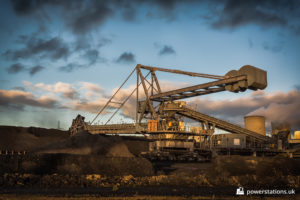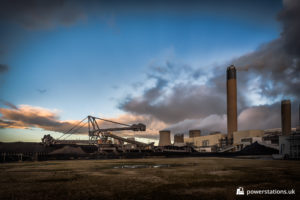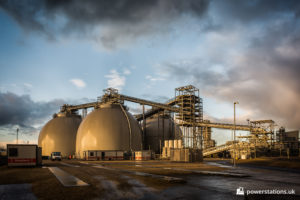Drax has an expansive fuel delivery and processing network. The part-conversion to biomass necessitated construction of additional storage facilities on site, along with a supply chain from North America.
Coal Handling and Storage

The original fuel processing and storage facilities at Drax is a relatively standard affair, similar to those at other large power stations in the UK. The coal was delivered via rail from the nearby collieries, mainly Kellingley, but since the closure of the UK’s last deep-level mine in 2016, coal is now imported from overseas. A merry-go-round system allows trains to be unloaded without stopping, before returning to collect more coal. Coal can be stored outside, open to the elements until it is ready to be used. Two bucketwheel excavators load coal from the stacks into the conveyor network to feed the power station.
Biomass Transportation and Handling
Biomass requires much more care when being handled and stored than coal. It must be kept dry at all times – the pellets would need to be scrapped if they became wet. In addition, the dust created while handling biomass can create an explosive atmosphere, so must be carefully controlled.
![Wood pellet shipment at ABP Immingham [Image courtesy Drax Power]](http://powerstations.uk/wp-content/uploads/sites/3/2017/12/Drax-Ship-Immingham-300x200.jpg)
![Biomass train at Drax Power Station [Image courtesy Drax Power]](http://powerstations.uk/wp-content/uploads/sites/3/2017/12/Drax-Biomass-Train-300x200.jpg)





9 thoughts on “Drax Power Station”
► Read comments or add your own on the main page